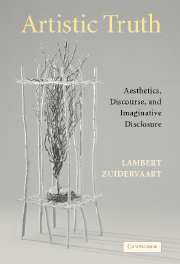Book contents
- Frontmatter
- Contents
- Preface
- List of Abbreviations
- Artistic Truth
- Introduction: Critical Hermeneutics
- PART I HERMENEUTICAL MATRIX
- PART II CONSTRUCTIVE CLEARINGS
- PART III LINGUISTIC TURNS
- 7 Logical Positivist Dispute
- 8 Goodman's Nominalism
- 9 Wolterstorff's Realism
- 10 Aesthetic Transformations
- Notes
- Bibliography
- Index
8 - Goodman's Nominalism
Published online by Cambridge University Press: 13 July 2009
- Frontmatter
- Contents
- Preface
- List of Abbreviations
- Artistic Truth
- Introduction: Critical Hermeneutics
- PART I HERMENEUTICAL MATRIX
- PART II CONSTRUCTIVE CLEARINGS
- PART III LINGUISTIC TURNS
- 7 Logical Positivist Dispute
- 8 Goodman's Nominalism
- 9 Wolterstorff's Realism
- 10 Aesthetic Transformations
- Notes
- Bibliography
- Index
Summary
Truth and its aesthetic counterpart amount to appropriateness under different names.
Nelson GoodmanThe debate between Richards and Greene assumes a general agreement that science is the paradigmatic field of knowledge. They disagree on whether artworks convey propositions and whether correspondence is a legitimate criterion for evaluating art. With the Goodman-Wolterstorff debate, the areas of agreement and disagreement shift. Their debate does not assume that science is the paradigmatic field of knowledge or that art is somehow more emotive than science. Perhaps the most unexpected area of agreement is that art has important cognitive functions – unexpected, given the emotivism of logical positivists such as Richards and the anticognitivism of other analytic aestheticians such as Beardsley. Both Goodman and Wolterstorff set out to explain these cognitive functions, Goodman in terms of symbolization, and Wolterstorff in terms of world projection. Both of them wish to locate the arts in a larger ontology within which the arts make important contributions to understanding and knowledge. They share a type of antiempiricism with respect to knowledge, combined with cognitive functionalism with respect to cultural areas such as art and science. They differ, however, in three crucial respects. Whereas Wolterstorff's ontology is realist, Goodman's is nominalist. Whereas Wolterstorff regards art as a field of action, Goodman regards art as a symbol system. And whereas Wolterstorff has an intentionalist account of art's cognitive contributions, Goodman's account is a version of conventionalism.
- Type
- Chapter
- Information
- Artistic TruthAesthetics, Discourse, and Imaginative Disclosure, pp. 162 - 181Publisher: Cambridge University PressPrint publication year: 2004



